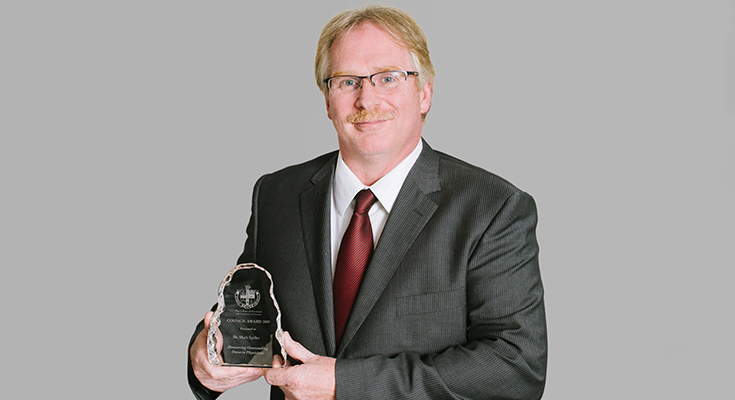The Dynamo of Kirkland Lake

Dr. Mark Spiller
Dr. Mark Spiller of Kirkland Lake was presented with the CPSO Council Award at the September 2019 Council meeting. Dr. Spiller is the Chief of Staff at the Kirkland Lake and District Hospital, where he also serves as the Chief of Family Practice and Emergency Medicine.
Dr. Spiller has devoted 29 years of medical practice to his Kirkland Lake community, where he has had a profound effect, transforming the medical institutions and impacting the care of patients. In addition to many years of service as chief of staff, he has been a coroner and the telehealth medical director. He is an assistant professor at the Northern Ontario School of Medicine and, in addition to working in the Kirkland Lake hospital’s emergency department, he does emergency room shifts at the nearby Englehart and District Hospital. He also attends to patients at a clinic that helps serve the Matachewan First Nations Reserve.
Dr. Spiller was born and raised in Toronto and moved to Kirkland Lake shortly after graduating from the University of Toronto’s School of Medicine. His leadership skills and positive attitude are credited with improved access to care in the community, such as by bringing the OTN and Virtual Critical Care pilot projects to the Kirk- land Lake and District Hospital. As a physician recruiter, he has worked tirelessly to find and entice physicians to join the community, the result of which is a robust hospitalist program in Kirkland Lake with visiting specialists from across the spectrum. From his earliest days in the community, Dr. Spiller has been a champion and facilitator of resource sharing among health-care professionals and the two local hospitals, all with a view to ensuring comprehensive, timely care in the community. Not surprisingly, he was recently appointed the first chief of staff for the soon to be amalgamated Kirkland Lake and Englehart hospitals.
We recently spoke to Dr. Spiller about his life and work:
Is it true that medicine was not your first career choice?
Yes, it’s true! I had originally intended to be a veterinarian but vet school spaces were very limited in those days and it was difficult to get a place. When I was considering other career options, I thought about my interests and academic focus (biology and neuroscience) – but I also really wanted to pick a career that would not be boring, that would keep my interest for a long time. Human interaction, as any physician will tell you, is never boring!
You were city-born and raised – what made you decide to move to northern Ontario?
To be honest, I always wanted to work in ‘cottage country’. My mom was a teacher who taught in a four-room school house in Unionville, which was more or less a rural area in those days. I would often visit her and hang out with her students on their farms. I loved it. After my medical training, I took advantage of a government initiative that let me tour the medical environments in several northern, underserviced communities in the province.
How did you end up choosing Kirkland Lake as the place to settle down?
That’s a funny story. As I said, I visited a bunch of places in the north during my tour, one of which was Kirkland Lake. The medical community was extremely welcoming and I could tell it was a place where people took care of each other. I bought a house in the area before I was even offered a position! Luckily, at the same time, the physician responsible for running the Kirkland Lake emergency room resigned, so I was asked to take over working in the emergency department and doing the schedule. I said “yes”, and I’ve been doing it for 29 years now.
I like to paint a picture of the whole person — not just their disease or the issue that brought them to the emergency room that day
You colleagues say you humanize patients when describing their care or sharing information. Why is that important to you?
It’s true, when I hand over a patient’s care to a colleague, I like to paint a picture of the whole person — not just their disease or the issue that brought them to the emergency room that day. It’s a small community, and it is very rare for me to see a patient I don’t know; so it is easy to know the little facts and stories that make them who they are. And I think it is important for all of us in the care circle to recognize patients as people — sometimes you need the personal context to effectively treat the disease.
I also take the time to really chat with patients and explain everything to them. Patient education is important — once the patient has all the information and understanding, it makes it easier for them to handle treatment and their situation.
What are the important considerations when looking for physicians to join your community?
Well, in general, all small communities are terribly underserviced, and most specialists are welcomed with open arms. But at the end of the day, I want to improve the health-care service we provide in every corner of Kirkland Lake. The best physicians for our community see what I saw when I arrived here 29 years ago: a medical community full of camaraderie and support that is just incredible. People who come here form friendships and work hard. We attract like-minded people and the right ones tend to stay.